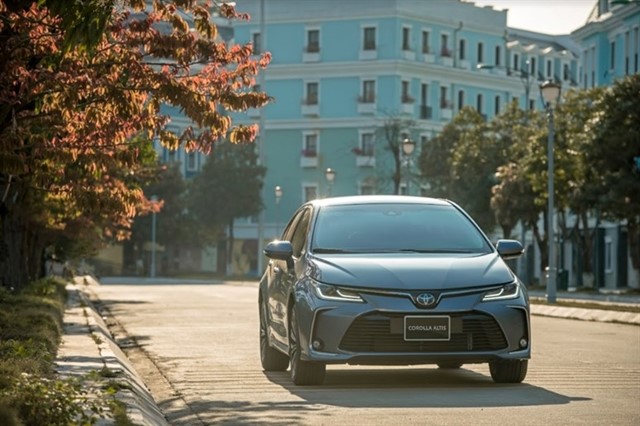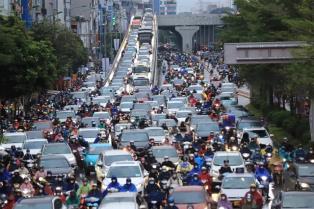The proposed decrease in tax rates for self-charging hybrid electric vehicles (HEVs) with nine seats or fewer, as outlined in a draft law by the Ministry of Finance, appears to be a significant shift in tax policy, according to experts.

Vietnam Automobile Manufacturers (VAMA) has proposed a change in the special consumption tax rates (SCT) to better reflect the environmental benefits of different types of vehicles.
Under its proposal, VAMA suggests that the tax on HEVs (hybrid electric vehicles), should remain at 70 per cent of the rate applied to conventional petrol or diesel cars. This is because HEVs offer a 30-40 per cent improvement in fuel efficiency and emissions compared to internal combustion engine vehicles.
VAMA also has proposed reducing the tax on PHEVs (Plug-in Hybrid Electric Vehicles) to 50 per cent of the rate applied to petrol or diesel cars, down from the current 70 per cent. This is because PHEVs are more efficient, saving over 50 per cent in fuel compared to conventional vehicles and thus should be incentivised.
Under the current special consumption tax rates, vehicles running on petrol and electric power, where fuel use does not exceed 70 per cent of the total energy used, are taxed at 70 per cent of the rate applied to purely internal combustion engine (ICE) vehicles.
According to the VAMA, HEVs and PHEVs are less prevalent in Việt Nam compared to other countries. The existing special consumption tax rates in Việt Nam make HEVs and PHEVs 10-20 per cent more expensive than comparable internal combustion engine (ICE) vehicles.
By adjusting the tax rates, VAMA said it will make HEVs and PHEVs more financially attractive to consumers, which could lead to higher adoption rates. This, in turn, would support Việt Nam’s Net Zero commitment by reducing overall emissions by 2050.
Tax expert of KPMG, Nguyễn Ngoc Thái, highlighted how preferential tax policies have been successful in boosting the adoption of HEVs and PHEVs in other countries.
One example is that Thailand offers preferential tax rates ranging from 17-27 per cent lower than those for internal combustion engine vehicles. Meanwhile, Indonesia provides a significant tax reduction, with rates ranging from 8-40 per cent lower.
By doing so, the sales of PHEVs and HEVs surged by 86.58 per cent in 2022 in Thailand and the market share of PHEVs and HEVs in Indonesia grew from 2 per cent in 2018 to 15 per cent in 2023, reflecting a substantial increase in adoption driven by the tax incentives.
However, VAMA's calculations indicate that the special consumption tax rates incentives for PHEVs and HEVs are set at 50 per cent and 70 per cent respectively, compared to internal combustion engine vehicles, this will result in a decrease in State budget revenue in the short term.
In return, Việt Nam is making a significant effort to improve its energy efficiency and reduce its reliance on imported crude oil. By cutting fuel consumption by over one million litre annually, the country is not only saving a substantial amount of money – about VNĐ27 trillion (over US$1 billion), but also lessening the need to import over 14 million barrels of crude oil, which amounts to VNĐ29 trillion. This move will help ease the pressure on the Vietnamese trade balance.
The special consumption tax incentives for PHEVs and HEVs would be a strategic move to make these eco-friendly options more affordable for consumers. This approach not only encourages the adoption of cleaner vehicles, but also helps in significantly reducing CO2 emissions by over 2.6 million tonnes, in this case. Such reductions are crucial for meeting carbon emission reduction goals in the transport sector.
In addition, the trend of adjusting tax policies to favour indirect taxes, like value-added tax (VAT) and special consumption tax, over direct taxes aligns with broader global practices. Indirect taxes, which are levied on goods and services rather than income, can be adjusted to encourage sustainable behavior and generate revenue without directly impacting personal income. This shift is part of a broader strategy to balance tax systems while promoting environmental sustainability and economic efficiency.
An expert from the General Department of Taxation Nguyễn Văn Phụng observed that Việt Nam, in line with global trends, is adapting its tax policies by shifting from direct to indirect taxes. This strategic approach is being adopted to better align with current economic needs and international practices.
However, Phụng emphasised that while shifting tax policies towards indirect taxes aligns with global trends and economic needs, it is crucial to design these policies carefully to avoid unintended negative effects. — VNS





